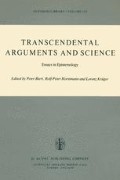Abstract
In his contribution, Prof. Rorty suggested that transcendental arguments are only useful as a means of providing self-referential ad hominem arguments against particular philosophical views, showing that those views fail to make good sense of our knowledge, such as it is, and of our dealings with the world. I do not know if Rorty is correct, for I still do not understand how to delimit transcendental arguments properly. But my argument fits his description. I will offer a self-referential ad hominem argument against the theory of (scientific) truth offered by Wilfrid Sellars and largely shared by Jay Rosenberg. In spite of its specific concern with Sellars, the argument is of general interest. It has two principal strands. One, picked up by Prof. Parsons in his comments, shows that Quine’s doctrine of indeterminacy of translation is incompatible with the most interesting forms of what Sellars, Putnam and Rosenberg call Peircean realism. During the last two years I have been persuaded, rather against my will, that the indeterminacy of translation cannot be evaded. Accordingly, I hold that Peircean articulations of scientific realism cannot be adequately defended. The other major strand of the argument concerns the correction of fact-stating claims forced on us by theory replacement and by conceptual change in science. Such correction undermines the vestiges of a ‘growth by accretion’ model of the development of science which are still to be found in Sellars’s and Rosenberg’s writings. In its general thrust, my argument supports Putnam’s contention that all viable articulations of scientific realism will land us in some form of what he calls “internal realism.”1
I wish to thank Prof. Catherine Elgin, Simmons College, for extraordinary help with this paper. Her positive views and constructive criticisms have informed its every page.
Access this chapter
Tax calculation will be finalised at checkout
Purchases are for personal use only
Preview
Unable to display preview. Download preview PDF.
Notes
Hilary Putnam, ‘Realism and Reason’, Proc. Am. Phil. Assoc. 50 (1977), 483–498.I am grateful to Prof. Putnam for supplying me with advance copies of this and of the forthcoming works referred to below.
For the best exploration I have yet seen of the effect of social factors on the structure and content of theoretical and factual claims in science, cf. J. Ravetz, Scientific Knowledge and its Social Problems, Oxford University Press, London, 1971.
H. Putnam, ‘The Meaning of “Meaning” ’in Putnam, Philosophical Papers, vol. 2, Cambridge University Press, Cambridge, 1975, pp. 215–271.
Cf., e.g., P. K. Feyerabend, ‘Explanation, Reduction and Empiricism’, in H. Feigl and G. Maxwell (eds.), Minnesota Studies in the Philosophy of Science, vol. 3, University of Minnesota Press, Minneapolis, Minn., 1962, pp. 28–98; ‘Problems of Empiricism’, in R. Colodny (ed.), Beyond the Edge of Certainty, Prentice-Hall Englewood Cliffs, N.J., 1965, pp. 145–261, ‘Reply to Criticism’ in Cohen and Wartofsky (eds.), op. cit. (note 4), pp. 223–261; and Against Method, New Left Books, London 1975. Cf. also SRII in which Sellars discusses the contrast between Feyerabendian change of theory and Sellarsian change of framework.
Cf. Quine, ‘Ontological Relativity’, p. 45. This essay appears in Ontological Relativity and Other Essays, Columbia University Press, New York, 1969, pp. 26–68. Cf. also Paul Benacerraf, ‘What Numbers Cannot Be’, Phil. Rev 74 (1965), 47–73.
A variant of this example is worked out the Hartry Field in ‘Theory Change and the Indeterminacy of Reference’, J. Phil. 70 (1973), 462–480. Field’s views are further developed in ‘Quine and the Correspondence Theory’, Phil. Rev. 83 (1974), 200–228. (I am grateful to Charles Parsons for calling this article to my attention.) Field argues against the inscrutability of reference (here, interpretation–dependence of the reference of the Newtonian term ‘mass’) and for an account based on “partial reference.” (The Newtonian term ‘mass’ refers partially to rest mass, partially to relativistic mass.) I cannot take up this matter here except to raise a worry: isn’t an account in terms of partial reference useless unless, implausibly, we have access to all equally defensible alternative construals of a term like ‘mass’ in the new framework (here, a relativistic framework)? But how can we determine whether we have exhausted all of the legitimate construals of ‘mass’ in Einsteinian mechanics, of ‘two’ within a set theoretical framework, of ‘gavagai’ in “the” common-sense middle-American framework?
Quine, ‘Carnap and Logical Truth’, p. 132 of the reprint in Ways of Paradox, revised ed., Harvard University Press, Cambridge, Mass., 1976.
Author information
Authors and Affiliations
Editor information
Editors and Affiliations
Rights and permissions
Copyright information
© 1979 D. Reidel Publishing Company, Dordrecht, Holland
About this chapter
Cite this chapter
Burian, R.M. (1979). Sellarsian Realism and Conceptual Change in Science. In: Bieri, P., Horstmann, RP., Krüger, L. (eds) Transcendental Arguments and Science. Synthese Library, vol 133. Springer, Dordrecht. https://doi.org/10.1007/978-94-009-9410-2_15
Download citation
DOI: https://doi.org/10.1007/978-94-009-9410-2_15
Publisher Name: Springer, Dordrecht
Print ISBN: 978-90-277-0964-6
Online ISBN: 978-94-009-9410-2
eBook Packages: Springer Book Archive

